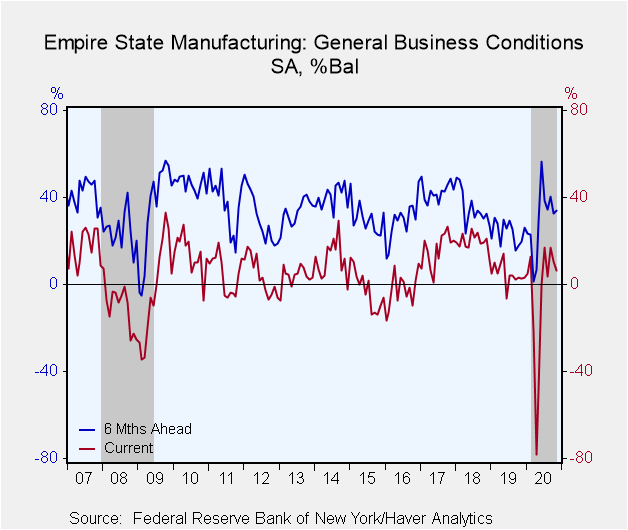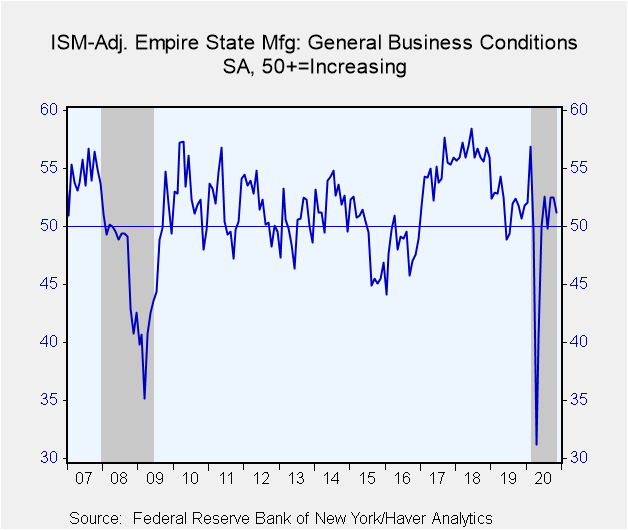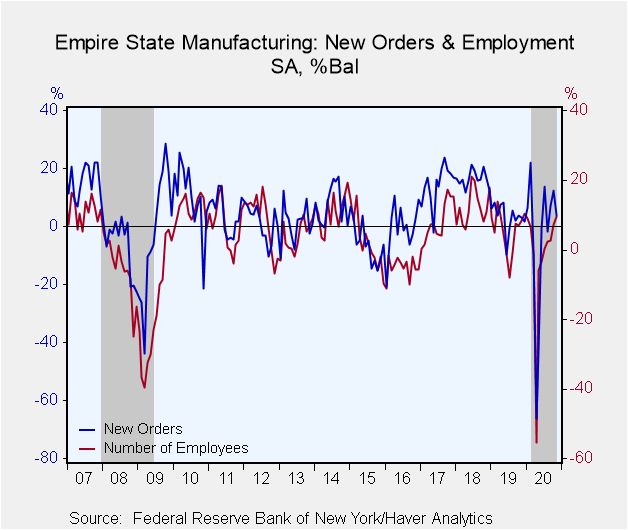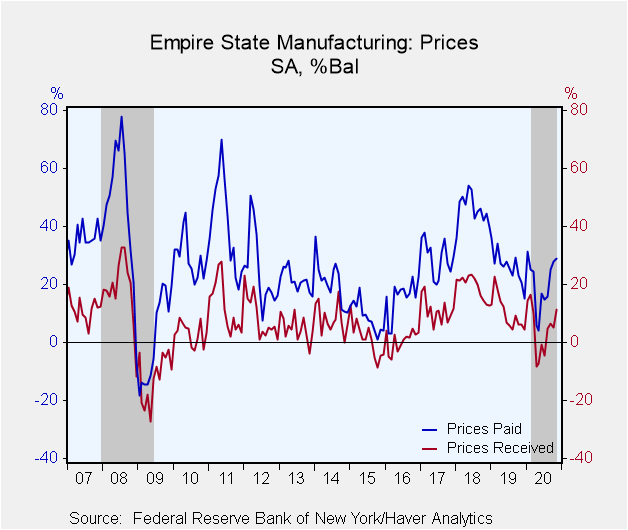 Global| Nov 16 2020
Global| Nov 16 2020Empire State Manufacturing Expansion Slows in November
by:Tom Moeller
|in:Economy in Brief
Summary
• Component declines are broad-based. • Pricing power improves. The Empire State General Business Conditions Index edged lower to 6.3 this month after easing to 10.5 in October. Nevertheless, it was the fifth consecutive positive [...]
• Component declines are broad-based.
• Pricing power improves.
The Empire State General Business Conditions Index edged lower to 6.3 this month after easing to 10.5 in October. Nevertheless, it was the fifth consecutive positive reading. A lessened 30.8% reported increased business conditions in November, down from 35.8% in October, while 24.4% reported a decline versus 25.3% in October. The Business Conditions measure is a diffusion index, constructed by subtracting the percentage decrease from the percentage increase, The total is constructed from the answer to a single question on business conditions. The Action Economics Forecast Survey expected a decline to 13.8.
Haver Analytics calculates an ISM-Adjusted Index which is similar to the ISM purchasing managers' index. This figure slipped to 51.2 in November. It was the fifth month in the last six above 50, which indicates expansion in business activity.
Most of the underlying series weakened this month. The new orders index eased to 3.7, its lowest point in four months. The shipments measure similarly fell to 6.3, its lowest level since June. At -11.9, the unfilled orders measure remained negative as it has since April. The delivery times index fell to the lowest level in six months, indicating quicker delivery speeds. Inventories continued to fall as they have since April.
The labor market readings were mixed in December. Working higher, the employment measure rose to 9.4, its best reading since December. An increased 20.2% of respondents reported higher payrolls while a greatly lessened 10.8% indicated a decline. Despite this improvement, the employee workweek measure fell to 4.8, its weakest reading in three months.
The prices paid index improved to 29.1 in November, its highest figure since January and up from May's low of 4.1. The prices received index posted a fourth consecutive positive reading, rising to 11.3 from 5.3 in October.
Optimism about the future remained positive. The index of general business conditions expected in six months improved to 33.9 from 32.8. Expectations for inventories, unfilled orders and delivery times rose while expected orders and shipments fell.
The Empire State figures are diffusion indexes, which are calculated by subtracting the percentage of respondents reporting declines from the percentage reporting gains. Their values range from -100 to +100. The data are available in Haver's SURVEYS database. The ISM-adjusted headline index dates back to July 2001. The Action Economics Forecasts can be found in Haver's AS1REPNA database.
| Empire State Manufacturing Survey | Nov | Oct | Sep | Nov'19 | 2019 | 2018 | 2017 |
|---|---|---|---|---|---|---|---|
| General Business Conditions (Diffusion Index, %, SA) | 6.3 | 10.5 | 17.0 | 2.5 | 4.8 | 19.7 | 16.1i |
| General Business Conditions Index (ISM Adjusted, >50=Increasing Activity, SA) | 51.2 | 52.5 | 52.5 | 50.7 | 51.8 | 56.4 | 54.6 |
| New Orders | 3.7 | 12.3 | 7.1 | 3.1 | 3.3 | 16.4 | 14.4 |
| Shipments | 6.3 | 17.8 | 14.1 | 7.3 | 10.5 | 20.3 | 15.8 |
| Unfilled Orders | -11.9 | -6.6 | -9.4 | -8.2 | -6.0 | 3.5 | 1.9 |
| Delivery Time | 0.7 | 2.0 | 5.0 | -5.5 | -0.1 | 9.1 | 6.1 |
| Inventories | -8.6 | -14.6 | -3.6 | -6.2 | -0.9 | 5.9 | 1.5 |
| Number of Employees | 9.4 | 7.2 | 2.6 | 8.5 | 5.4 | 12.3 | 8.0 |
| Average Employee Workweek | 4.8 | 16.1 | 6.7 | 1.9 | 2.3 | 7.8 | 4.6 |
| Prices Paid | 29.1 | 27.8 | 25.2 | 20.5 | 26.3 | 45.8 | 29.0 |
| Prices Received | 11.3 | 5.3 | 6.5 | 6.2 | 10.3 | 19.3 | 11.0 |
| Expectations 6 Months Ahead | 33.9 | 32.8 | 40.3 | 19.8 | 23.9 | 35.2 | 42.6 |
Tom Moeller
AuthorMore in Author Profile »Prior to joining Haver Analytics in 2000, Mr. Moeller worked as the Economist at Chancellor Capital Management from 1985 to 1999. There, he developed comprehensive economic forecasts and interpreted economic data for equity and fixed income portfolio managers. Also at Chancellor, Mr. Moeller worked as an equity analyst and was responsible for researching and rating companies in the economically sensitive automobile and housing industries for investment in Chancellor’s equity portfolio. Prior to joining Chancellor, Mr. Moeller was an Economist at Citibank from 1979 to 1984. He also analyzed pricing behavior in the metals industry for the Council on Wage and Price Stability in Washington, D.C. In 1999, Mr. Moeller received the award for most accurate forecast from the Forecasters' Club of New York. From 1990 to 1992 he was President of the New York Association for Business Economists. Mr. Moeller earned an M.B.A. in Finance from Fordham University, where he graduated in 1987. He holds a Bachelor of Arts in Economics from George Washington University.
More Economy in Brief
 Global| Feb 05 2026
Global| Feb 05 2026Charts of the Week: Balanced Policy, Resilient Data and AI Narratives
by:Andrew Cates










